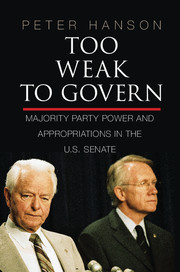Preface
Published online by Cambridge University Press: 05 November 2014
Summary
This is a book about party power in the Senate. How much power does the majority party in the Senate have to shape legislative outcomes to its liking? What are the sources of its power, and when is the majority likely to use it? How effectively can the majority party manage a chamber that is notoriously individualistic and so subject to delays and filibusters that the actual passage of legislation appears at times to be miraculous?
These are important questions. At stake is not just whether the Senate majority party can push its own legislative program to passage but whether it can pass any legislative program at all in today’s highly polarized environment. Dismal evaluations of the Senate abound. “Sit and watch us for seven days – just watch the floor,” Senator Michael Bennet (D-CO) lamented. “You know what you’ll see happening? Nothing.” The power granted by Senate rules to individual senators appears to have paralyzed the chamber rather than allow for the serious debate intended by the framers of the Constitution.
Former leaders of the chamber agree that there are few tools available to force action in the chamber. “When I was whip back in 2007 nd McConnell was leader, we were trying to move the ethics in lobbying reform bill to conference,” former Senate majority leader Trent Lott recalled. “Jim DeMint objected and Senator McConnell said, ‘Hey, whip, go over there and see if you can get him to relent.’ I tried. I tried. I got my chief deputy whip to go talk to him. I got his buddies to talk to him.
- Type
- Chapter
- Information
- Too Weak to GovernMajority Party Power and Appropriations in the U.S. Senate, pp. xiii - xxiiPublisher: Cambridge University PressPrint publication year: 2014



